 As a journalist who makes documentaries intended to spark conversations about our health and wellbeing, I’m very aware of the power of the majority. I believe that good old water cooler conversations and word of mouth are the crucial first step to creating positive, meaningful change. So when the third person in a week asked me if I’d seen the new Netflix documentary The Social Dilemma, I knew I had to see what all the fuss was about.
As a journalist who makes documentaries intended to spark conversations about our health and wellbeing, I’m very aware of the power of the majority. I believe that good old water cooler conversations and word of mouth are the crucial first step to creating positive, meaningful change. So when the third person in a week asked me if I’d seen the new Netflix documentary The Social Dilemma, I knew I had to see what all the fuss was about.The film features interviews with social media entrepreneurs as they lament their role in developing an industry model that they believe has polarised the public square and turned our individual attention into a lucrative commodity. The interviews are peppered with a docu-drama style narrative about a teenage boy who is unable to resist a trio of malevolent puppeteers using bespoke push notifications to distract him, serve him ads, and distort his views until he becomes embroiled in an angry protest movement, which ultimately results in his arrest.
The film’s intended purpose – to raise the alarm that all-powerful and unregulated digital platforms such as Facebook, Instagram, Google and YouTube are wholly responsible for the polarisation of society – is crystal clear. It has certainly generated click-worthy headlines ranging from This Documentary Will Make You Deactivate Your Social Media to The Social Dilemma: How digital platforms pose an existential threat to society. But the film’s adoption of a singularly critical narrative, delivered mostly by remorseful startup billionaires who’s “solutions” are left to the end credits, left me feeling despondent. What could have been a nuanced, persuasive deep-dive is easy to dismiss as more Millennial-bashing alarmism.
I’ve written previously on this blog about my own realisation that I had unwittingly entered into an unhealthy bargain with the tech companies of Silicon Valley. As I confessed in my piece Weapons of Mass Distraction: How Your Phone Hijacks Your Behaviour, half way through my own documentary self-experiment, My Year of Living Mindfully, I realised that Big Tech was stealing and selling my attention in exchange for a convenient distraction from anything in my life that was mildly unpleasant. Whenever I faced an overwhelming Inbox, felt bored in an elevator, or wanted to ignore my moody children, my all-too convenient distraction device offered a pseudo-wellbeing boost via a free hit of stimulation.
In my piece 5 Ways To Break Up With Your Phone, I also wrote about waking up to my smartphone addiction. I read all the best-selling books and enacted all the recommended hacks. But a few months later, I subsequently wrote that I soon fell off the wagon. My ancient human biology was no match for the latest in “intelligent” design.
But what to do? Throw my smartphone into Sydney Harbour and join the neo-luddites? My phone revolutionises my ability to navigate around town, effortlessly pay for things, easily contact people, conveniently manage my schedule, and lovingly document my kid’s developmental milestones.
It’s an exploration of the “how” of the course correction that must take place that really interests me.
In The Social Dilemma, this was addressed in brief sound bites as the credits rolled. “Delete your social media,” advised a founding father of virtual reality, Jaron Lanier. Not so helpful if you’re an independent journalist like me who needs a platform to share your work. “No screen time at all,” said former Pinterest president, Tim Kendall. Doesn’t he know that literacy and mathematics apps are assigned to my son for homework via Google Classroom? “Don’t let your kids have a social media account until they’re 16,” advised social psychologist Jonathan Haidt. Try telling that to a teenager at the peak of their social development. “Turn off all notifications,” recommended the billionaire programmer, Justin Rosenstein. All very well for someone who doesn’t have to keep up with their kid’s class notifications and soccer team updates.
Although I do understand that director Jeff Orlowski (and the mega-platform showcasing his film) probably oversimplified things in order to reach a broad audience with a message that, as the New York Times put it, we need to “unplug and run,” the reality is, Pandora’s Box has been well and truly been opened. Emerging scientific evidence warns of lost productivity, lost brain function, lost wellbeing, lost work-life balance, lost sleep, lost human connection, and even lost lives resulting from inappropriate use of technology such as smartphones. I worry that if I’m having trouble with tech addiction, what chance do my kids have?
We do need to talk about Big Tech – in documentaries, in the media, at the family dinner table, beside water coolers, and in parliaments. But I’d like to hear what thought-leaders, science-informed experts and decision-makers are doing about the practical “how” of going forward. Above all, I can’t help but wonder what advice Facebook CEO Mark Zuckerberg, who’s company owns the four most downloaded apps this decade, is giving to his two young daughters?
Perhaps there’s room here for another film? To be continued….





 My Year of Living Mindfully (DVD)
My Year of Living Mindfully (DVD) The Connection (DOWNLOAD-TO-OWN)
The Connection (DOWNLOAD-TO-OWN) My Year Of Living Mindfully - Book
My Year Of Living Mindfully - Book




